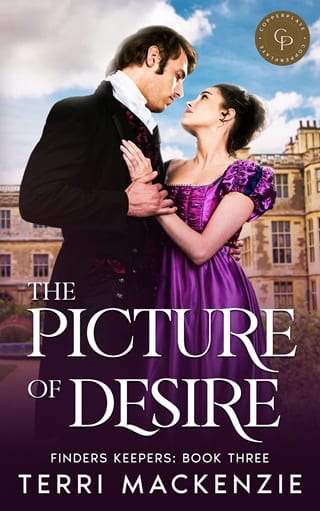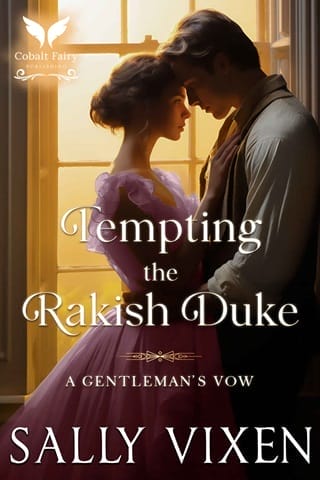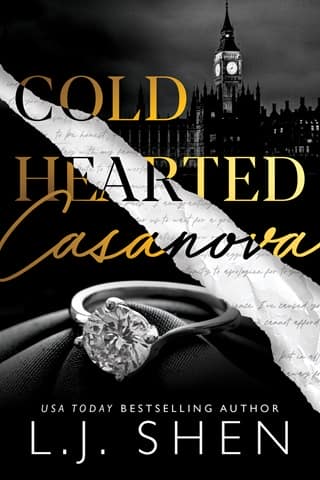Chapter Twenty-Eight
After confirming with his bank that the only way forward was to sell the London house, Henry made the necessary arrangements, and began the process of extracting his family from London. His father, unsurprisingly, was intractable, but when he was presented with the reality of the situation, all he could do was grumble and demand that he be given apartments of his own that he could rent.
Seeing there was no other alternative, Henry agreed.
His mother, however, he intended to remove from London, and Oliver would not be granted apartments in London at this time. Surprisingly, Oliver made no objection.
With everything else in motion, there was one thing left for him to do.
If Knight no longer had the painting in his possession, he could not use it against Louisa. The last of his duty towards her would be discharged, and she would no longer have her freedom and reputation threatened.
With the man himself still being absent from town, Henry did the only thing he could: the day after he returned from Yorkshire, he went out in search of the tavern that he and Louisa had followed the man named Markham to, all those days ago.
The night was cool, as nights were wont to be in April, and he strode through the streets, his greatcoat swirling around his legs and memories of the last time he had walked this particular street invading his mind. Louisa, defiant and proud, refusing to give in to his entreaties to leave. The way her body had pressed against his, and the awakening he had experienced. Bad enough that he had been forced to employ his restraint not to touch her; worse that she would have thrown off any attempt at affection.
Worse still that he now knew what said affection felt like.
He banished the thought and came to the creaking sign and spooling light of the tavern. Inside, the air was heavy with the scent of ale and cheap wine, candlelight casting as many shadows as it illuminated. Barmaids wound through the crowds of men with large jugs, filling tankards as they went, and giggling every time an errant hand squeezed their backsides.
Henry could only hope they were both inured to and desirous of such treatment, and he averted his eyes, picking a table at the back of the room. He had not long to wait: the man soon entered, ducking through the door and grinning his welcome at a plump maid. Henry kept to his place, accepting a tankard of watery ale (it would be more suspicious if he refused), and pretending to sip it at regular intervals. Markham, just as before, joined his fellows at the other side of the room and they immediately brought out a tattered pack of playing cards.
The minutes slipped by as Henry waited for Markham to drink, which he did with gusto. Eventually, he judged enough time to have passed, and rose, crossing the tavern with an exaggerated stagger and slumping into the only free seat around the table.
Up close and straight on, Markham had a broken nose, possibly as a result of a boxing match, and bloodshot eyes. Those eyes narrowed at Henry. "Who are you?"
"No one you'd know," Henry said, slurring a little.
"Then why are you here?"
"I believe you know my friend, Mr Knight."
"Friend? Hah." He spat on the floor. "He's like the rest of you bastards with your titles and your airs and graces."
Seeing an avenue, Henry rested his elbows on the table, something he would have chastised Oliver for doing. "And they never pay on time," he said.
"Aye, they're all promises, you lot." He frowned at Henry. "Thought you was a friend of 'is?"
"A reluctant acquaintance."
"Well ain't that just how it goes. What did he promise you?"
Henry sighed dramatically and waved to one of the barmaids. He had a roll of money in his pocket—the last easy money he had in his possession, in fact—and he gestured for the girl to fill Markham's tankard. "I'll pay his tab," he said, and the girl nodded, giving him an appreciative glance he ignored. To Markham he said, "Promised me a painting."
"Oh." Markham took a swig, belched, wiped his mouth with the back of his hand, and squinted at Henry. "What painting?"
"Of a girl. Called something foolish and whimsical. Said it would give me a chance to get one over its artist, but as always . . ." Henry let the thought trail away and busied himself staring at the dubiously sticky pool in the middle of the table. Ale, he hoped. "What did he promise you?"
"Money," Markham said, sniffing. "If I protect that painting you talked about. But I ain't seen hide nor hair of him in days, never mind the money he promised me for trailing that gentry mort."
Gentry mort , Henry surmised, must refer to Louisa.
"Can't trust him," Henry said.
Markham grunted and finished that ale. "Wine," he decided, pushing the tankard away from him. "This stuff makes your insides rot, take it from me. First time in here, my lord?" He gave an unpleasant smile, displaying two missing teeth. "Come to fleece me?"
If there was one benefit to being the son of an inveterate gambler, it was that Henry had been taught how to play since an early age. His skills were a trifle rusty, not having played since he left for Cambridge, but Markham was visibly drunk and he was sober. And he'd always had a head for numbers.
The odds were in his favour, so long as he did not make a mistake.
"How about a wager?" Henry asked, and brought out his roll of money. "Five hundred in exchange for the picture."
Markham chewed on his bottom lip, but there was a greedy flare in his eyes that Henry didn't miss. The man frequented this tavern; it could be assumed he had little by the way of ready cash. "What makes you think I have the painting?" he asked.
"I know you can get it. Mr Knight isn't yet home."
"He'd have my skin for it."
Henry flicked through the bank notes idly. "Believe me when I say he doesn't have a penny to rub together. Your patron is relying on the success of his blackmail endeavour to have the funds by which to pay you."
"Can't without the painting," Markham pointed out.
"I'm acquainted with the—the gentry mort as you referred to her. She won't pay up."
"You're just saying that."
Henry shrugged. "You can think so if you want."
Markham's gaze returned to the roll of money. "Five hundred," he repeated. "If I win."
Henry counted it quickly; the notes were in fifties, so it took very little time. "All this if you win," he said. "On my honour. And the painting if I win."
Markham smiled. "On my honour."
"I'll have the terms drawn up. What's your game of choice?"
Markham thought, cracking his scarred knuckles in a show of defiance. "Piquet," he decided at last. "Does that suit your lordship?"
Piquet and whist were the two games Henry had showed the most aptitude for, but he knew better than to let his relief show. "Very well. Let's play."
Markham called for more wine as the terms were set and the cards were dealt. Henry accepted his glass with resignation—no doubt it was too much for Markham to expect him to play sober.
The cards, he was reasonably assured he would win, but he would have a weak head for alcohol, and the more he drank, the less likely he was to find victory.
"Drink up, my lord," Markham said slyly. "You look thirsty."
Henry took a sip of the watery, vinegary wine, and set the glass back on the pockmarked table. "My turn to begin."
The game would end when a player reached 100 points or more, played in a series of parties, with the scores added up at the end of each partie.
Henry's best chance of victory would be to lure Markham into a false sense of security. If he lost the first two by a slim margin, made basic mistakes, then Markham would think the game already won. By the looks of it, he was more a fighter than a gambler, and an initial show of strength—or weakness—went a long way.
He took another sip of wine and a sense of calm overcame him. Perhaps he was breaking all his rules, but the thought came with a measure of relief. For Louisa, it was worth it.
Besides, what good had his rules done him? His family was already ruined, and not all his restraint could have prevented it.
The game began in earnest.
Henry was the first to play, and he deliberately chose a poor opening gambit. Markham's face remained impassive, but his middle finger twitched, and Henry marked the movement. Every time Markham thought he had the upper hand, whether he was withholding information during the declaration phase, or if he thought Henry had played badly, his finger twitched. An infinitesimal movement that would be utterly indistinguishable if it were not for Henry's careful watchfulness.
There was a certain flare to gambling that Henry did not possess: he was not a man for whom the best modes of play were instinct. Instead, he carefully analysed the probability behind each card being played, and used that in conjunction with what he knew of his opponent's tells.
He lost the first round, but only by a handful of points. Then he lost the second by a higher margin, constantly calculating. The wine muddied his thoughts a trifle, and whenever Markham looked down at his cards, he made a point of slopping a little more wine on the straw-covered floor. Even so, after two hours and four parties, Henry was drunker than he had been for over a decade, perhaps longer. He scratched at the stubble growing in across his jaw, feeling the coarse hair under his nails as though he was distanced from his body.
Markham was still ahead, but the gap between them now was imperceptible.
Henry needed to win soon or he risked not winning at all.
Beads of sweat appeared on Markham's brow, and he wiped them away with the cuffs of his shirt. Henry rolled his shoulders, slumping in a way that went against every engrained habit. His shoulders curved inwards: the posture of a defeated man.
Markham leant forward, elbows on the greasy wood. "What do you want the painting for?"
"Does it matter?" It was entirely too easy to let his voice slur.
"Got a vendetta against Knight or the girl?" A thought appeared to occur to him, and he scratched an eyebrow with a cracked nail. "Or trying to protect her? I heard she's a rich widow. Think she'll marry you if you give her the painting?"
The thought made Henry want to laugh. "Nothing would prevail on her to marry me."
"Aye, she's a knowing one."
Henry reached for his wine, then hesitated, looking into the dregs of the glass. How many had he had now? Too many.
"More wine," Markham called, waving a clumsy hand. At the woman's approach—she did not look a day under forty—he slapped her backside with enough force that she slopped ale on the table.
"I'll bring some glasses over," she said, giving Henry a flirtatious smile. He was so tired. More wine was the last thing he needed, but he was too late in saying anything, and perhaps it was better he hadn't. Markham needed to believe he was a drunken fool—and perhaps he was. He felt beyond sharp commands, close to the state of liberal goodwill that his father always found himself face-up in. A sense that the world had righted its injustices just for him, that he could do no wrong and lose nothing. That he was basking in the warmth of fate's smile.
Fate, in Henry's experience, had been nothing but fickle and rarely smiling. Still, he did his best to loosen his limbs and slump in his chair.
"Let's finish this game," he said.
Henry had not been to Louisa's house in Arlington Street before, and it was with his head tipped back that he contemplated the elegant Grecian-style front and the steps that led to the front door. The flickering lamps cast indifferent light, and he still felt grimy from the tavern.
He raised his hand and knocked on the door. After a few moments, he knocked again. And again.
Eventually, a bolt was drawn and a portly, bushy-browed butler stood with a lamp in his hand.
"I'm here to speak with Lady Bolton."
The butler stared him down impassively. "Her ladyship is asleep."
"Already?" Henry frowned.
"It's past two in the morning, sir."
"Ah." Later than he'd thought. The world swayed alarmingly. Somehow, the cold air had only served to make his inebriation worse. "Then I suppose you won't grant me entry?"
"No, sir."
"Very well." Disappointment curdled in his gut, but he concealed it by thrusting the sealed tube under his arm at the butler. "Would you be so good as to present this to her ladyship when she arises?"
The butler stared down his nose at the offering before accepting it. "Very well, sir. Would you like me to convey a message?"
"Tell her that Lord Eynsham has . . ." There was the oddest lump in his throat. He cleared it and spoke through the obstruction. "Tell her that I came to see her."
The butler's face remained utterly impassive. "Is that everything?"
"In fact," Henry said, finally alighting on an idea. "Perhaps you would like me to write a note? It would be easier than expecting you to remember."
"My memory is impeccable, sir."
"Even so, I think it would answer admirably."
With an expression of great patience and forbearance, the butler stepped back to allow Henry into the house, directing him to a small morning room where there was a bureau containing writing paper and ink. After handing his package carefully to the butler's care, he bent over the writing desk and dipped the pen in the ink.
Dearest Louisa,
I hope this may bring you a measure of relief, and will convince you of the depth of my affection.
Tomorrow, I leave for the country, and do not expect to return to London for the foreseeable future.
You have, as always, my heart.
Yours,
Henry
He signed with a flourish and stared stupidly at the words for a few moments, wishing they would stay in place rather than spinning so helplessly.
"Have you finished your note, sir?" the butler asked from behind him, and he started, rising from the chair.
"Yes. Indeed yes. Thank you for your time." Remembering his manners at the last minute, he executed a crisp bow that was only marred by the fact he tripped over his own feet.
The butler blinked. "Would you like me to call a cab for you, my lord?"
"No, no." Henry rubbed at his forehead. "The walk will do me good, I think. Thank you for your time."
The butler's expression cracked enough for Henry to see the shadow of a smile. "Not at all, Lord Eynsham."
Oliver may have become unexpectedly responsible since learning the true nature of their financial position, but he was still a boy of eighteen, and although it was an ungodly hour when Henry stumbled back into the house, Oliver had just arrived home.
He frowned at the boy, trying to see straight. "What were you doing?"
"Cockfight," Oliver said, and sniffed. He recoiled. "Good God! Are you drunk ?"
Henry was obliged to lean against the ornate post at the bottom of the stairs. It was carved in the shape of a sleeping dragon and he would miss it dearly, just as he would miss everything when they finally left this place.
"Yes," he said slowly. "I believe I am."
For a long moment, Oliver merely stared at him. The snub-nosed boy he had been looked distinctly more dangerous in this half-light—a fierce, eagle-eyed adult, freckles disappearing and hair tamed. They looked nothing alike, Henry with his dark hair and Oliver with his blonde. Even their eyes were different. But there was that Beaumont stubbornness, manifested in different ways.
Then he stepped closer. "Have you ever been drunk before, Henry?"
"Once or twice when I was younger," he said, moving away from the support of his post. The world felt distinctly less stable without it. "This is the first time in—a decade?" He frowned, trying to remember. He'd kept his head more or less when he was playing, but the worst of it had hit when he was walking home, and even the cold air had been insufficient to sober him.
"Here, let me help you upstairs," Oliver said, finally coming within gripping distance and heaving Henry's arm—which felt rather too heavy for a mere appendage—over his shoulders. "What brought this on?" he asked, a little timidly. "If you don't mind saying, that is."
The answer was that he needed something from Markham, but the truth was more sordid: he had allowed himself to break his careful rules because he no longer cared.
"Because I'm tired," he said as he stumbled upstairs. "And, quite rightly, no one seems to notice how tired I am."
"You never let anyone see."
"Whelp."
"It's true," Oliver protested. "And I'm only saying this now because you won't remember tomorrow. But how can anyone help if you never let them?"
"Because the person who, for most of my life, should have been the one to help has been the one causing the majority of my problems." Henry swayed at the top of the stairs, and Oliver steadied him. "That doesn't endear one to the prospect of asking for help."
"Not everyone is like Father."
"Perhaps not," he admitted. With Oliver guiding him, he made his way to his bedchamber. A cold, stark room lacking most creature comforts. Another sacrifice he had made for the good of his family—and that had gone all but no way towards repairing the damage done to the estate.
"Must we sell the house?" Oliver asked plaintively, ducking out from under Henry's arm.
Henry put a hand against the door, but it gave way underneath him and he staggered inside. The room was dark, his bed a mere black mass at the other end of the room. Somewhere was his washbasin and nightshirt. He decided he would not attempt to find either.
"No. But it's none of your concern. You will go to university, and then you will find yourself an occupation."
Oliver's smile was small and self-deprecating. "Such as the army? Or perhaps I should find a living?"
"Contemplate your options once you've graduated." He hesitated, his mind turning in slow circles as he turned over what he wanted to say in his head. "Whatever you choose, I will support you to the best of my ability. But no more debts, if you please." He gave a creaking smile that felt as though it had come from the depths of his past, though it was only before the crisis of their current situation. A few days had turned into years in the sticky honey of his thoughts. "At least, not until we can afford to pay them off."
 Fullepub
Fullepub 



